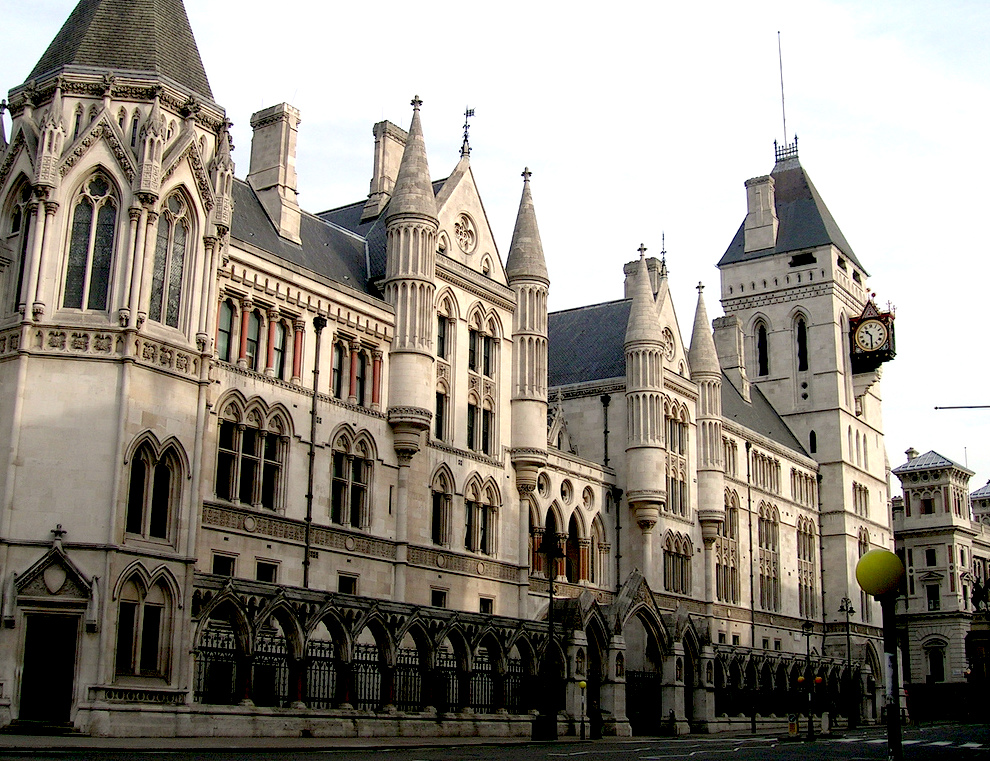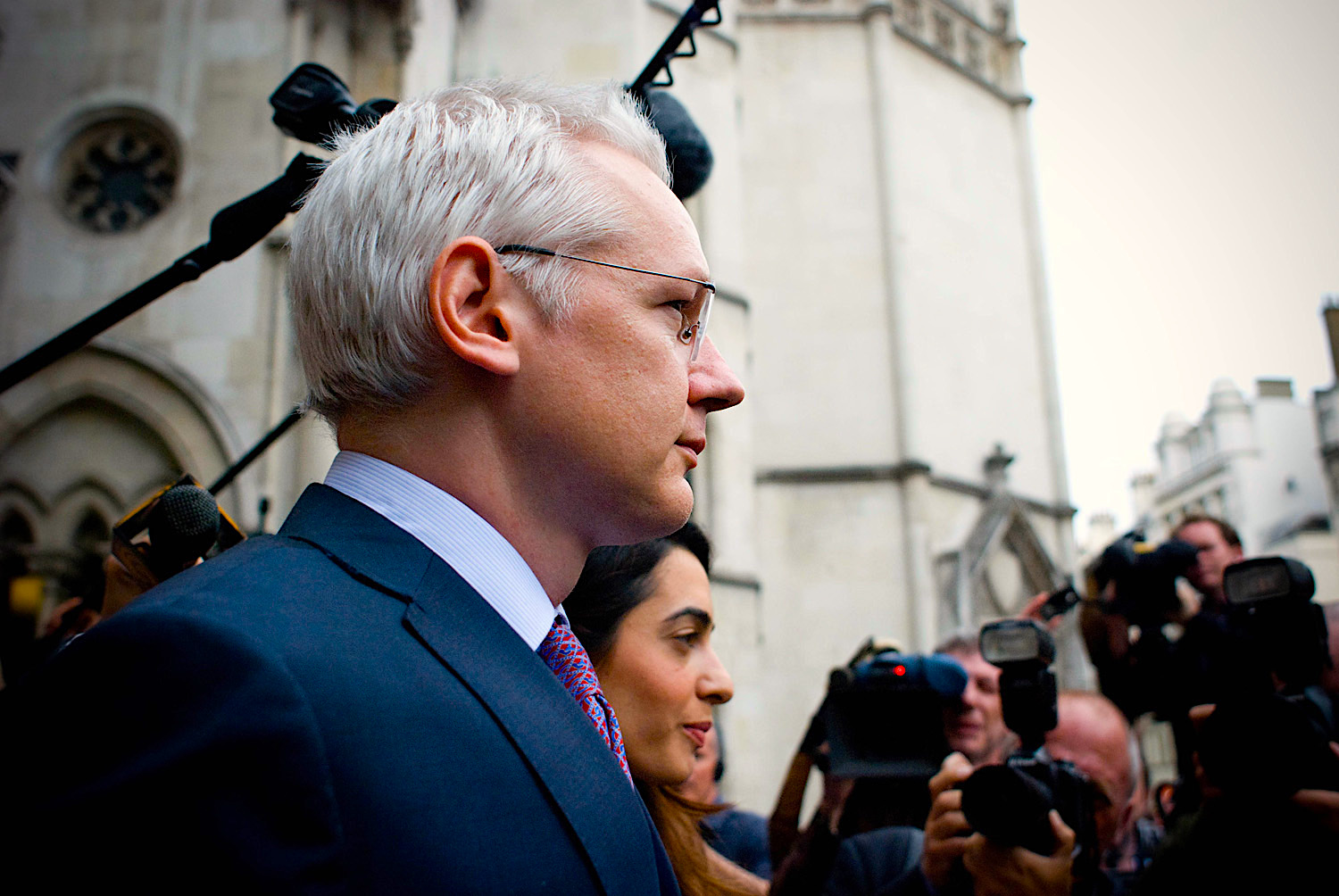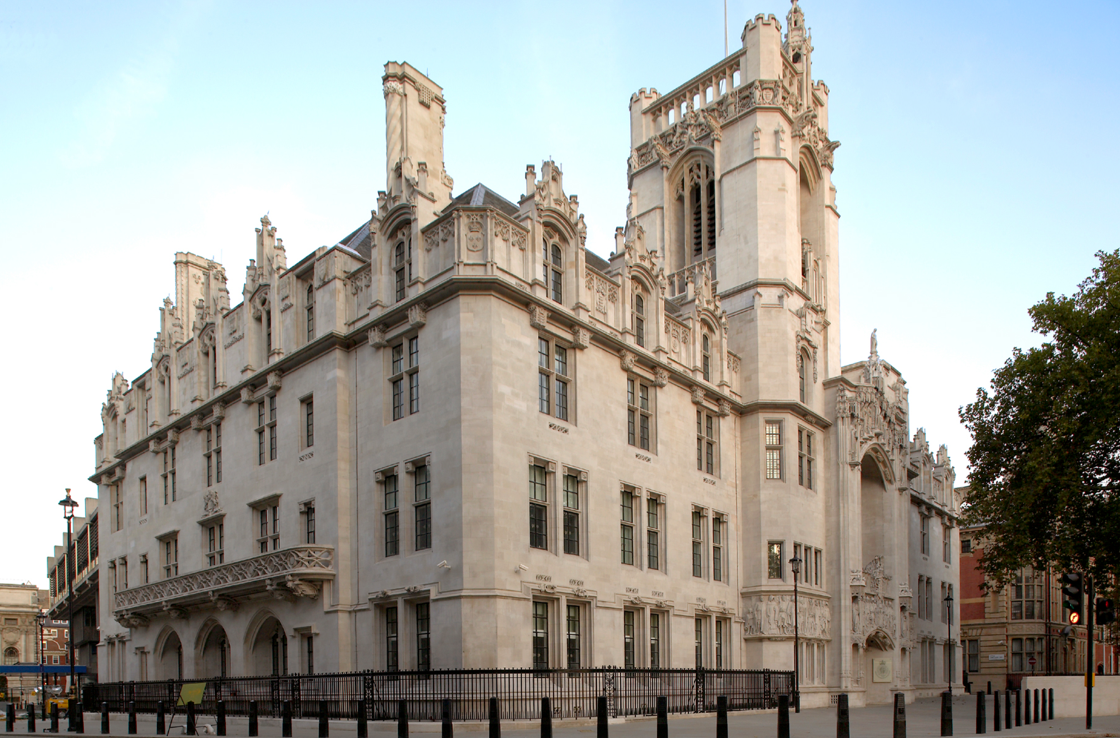If this happens, the hearing at the High Court in London will acquire epochal importance, writes Alexander Mercouris.

The Royal Courts of Justice on the Strand, home to the High Court in London. (Sjiong, CC BY-SA 2.0, Wikimedia Commons)
By Alexander Mercouris
in London
Special to Consortium News
 Julian Assange’s lawyers are considering bringing a cross appeal to the High Court in London disputing parts of District Judge Vanessa Baraitser’s Jan. 4 judgment not to extradite Assange to the United States, according to a report by journalist Tareq Haddad.
Julian Assange’s lawyers are considering bringing a cross appeal to the High Court in London disputing parts of District Judge Vanessa Baraitser’s Jan. 4 judgment not to extradite Assange to the United States, according to a report by journalist Tareq Haddad.
Baraitser refused the U.S. request on narrow grounds, saying Assange’s extradition would put his life and health at risk. But Baraitser sided with the U.S. on every other point of law and fact, making it clear that in the absence of the life and health issues she would have granted the U.S. request.
That opens the way for the U.S. government to seek the extradition of other persons, including journalists, who do the same things as Assange did, but who cannot rely on the same life and health issues.
It also means that if the U.S. wins the appeal it filed last Friday in High Court it can try Assange in the U.S. on the Espionage Act charges that went unchallenged by Baraitser. If Assange’s lawyers counter the U.S. appeal with one of their own in the High Court against Baraitser’s upholding of the espionage charges, it would be heard simultaneously with the U.S. appeal.
Stella Moris, Assange’s partner, has written that Assange’s lawyers are indeed considering a cross appeal:
“The next step in the legal case is that Julian’s legal team will respond to the US grounds for appeal. Julian’s lawyers are hard at work. Julian’s team has asked the High Court to give them more time to consider whether to lodge a cross appeal in order to challenge parts of the ruling where the magistrate did not side with Julian and the press freedom arguments. A cross appeal would provide an opportunity to clear Julian’s name properly.
Although Julian won at the Magistrates’ Court, the magistrate did not side with him on the wider public interest arguments. We wanted a U.K. court to properly quash the extradition and refute the other grounds too. We wanted a finding that the extradition is an attempt to criminalise journalism, not just in the U.S. but in the U.K. and the rest of the world as well; and that the decision to indict Julian was a political act, a violation of the treaty, a violation of his human rights and an abuse of process. Julian’s extradition team is considering all these issues, and whether they can be cross-appealed.”
The Question of a Political Offence

Julian Assange outside the High Court in London, 2011. (acidpolly/Flickr)
During Assange’s extradition hearing, the prosecution and the defence clashed about whether the court should adhere to the U.S.-U.K. extradition treaty or the Extradition Act, which made the treaty part of British law.
Article 4 of the treaty prohibits extradition for a political offence, as British law for centuries has done. The Act mysteriously omitted this. Assange’s attorneys clearly argued for the treaty to be followed, but Baraitser cited the Act.
In his article, Haddad pointed to comments by British MP and former Cabinet Minister David Davis to the House of Commons on Jan. 21.
Davis, who as the Conservatives’ shadow home secretary played a central role in the parliamentary debates which resulted in the 2003 Extradition Act becoming law, told the House of Commons:
“Although we cannot, of course, discuss the substance of the Assange judgment here today, the House must note the worrying development more generally in our extradition arrangements – extradition for political offences. This stems from an erroneous interpretation of Parliament’s intention in 2003. This must now be clarified.
Article 4 of the U.K.-U.S. extradition treaty provides that extradition will not be granted for political offences. In the U.K., the treaty was implemented in the Extradition Act 2003. It has been claimed that, because the Act does not specifically refer to political offences, Parliament explicitly took the decision to remove the bar when passing the Act in 2003. That is not the case — Parliament had no such intention.
Had it intended such a massive deviation from our centuries-long tradition of providing asylum, it would have been explicit….”
In making these points Davis cited reassurances given to the House of Commons during the parliamentary debates which took places before the 2003 Extradition Act was voted into law. Davis specifically referred to certain comments made by the British Minister Bob Ainsworth. According to the official record of the debates in Hansard, Ainsworth told the House of Commons:
“The Bill will ensure that no one can be extradited where the request is politically motivated, where the double jeopardy rule applies or where the fugitive’s medical condition— an issue raised by my hon. Friend the Member for Leyton and Wanstead (Harry Cohen) — would make it unjust. On conviction in absentia cases, we will extradite only where the fugitive can be sure of a retrial. We will not extradite unless we are certain that the death penalty will not be carried out. Finally and very importantly, extradition cannot take place where it would be incompatible with the fugitive’s human rights.” (Emphasis added)
British courts do not usually weigh comments made in parliament when considering how to interpret an Act of Parliament. The British legal tradition is to interpret an Act of Parliament strictly on the basis of its own wording. British courts do not generally look at what was said during parliamentary debates about an Act, even by ministers who propose it. However there have been numerous exceptions, and it is not a hard and fast rule.
British appeal courts also are generally reluctant to look at evidence, such as Davis’s comments, which come about after the judgment that is being appealed. That too, however, is not a hard and fast rule.
One should be cautious about the idea of a cross appeal to the High Court on Assange’s behalf. Despite the fact that Baraitser sided with the U.S. government on most of the contentious issues of law and fact in the case, she did in the end refuse the U.S. government’s request for Assange’s extradition. The normal practice in an appeal is to uphold a judgment made in one’s favour, not to challenge it by bringing a cross appeal, which could serve to undermine it. That often means going along with things in the judgment with which one is unhappy.
There is however nothing normal about Assange’s case. As Moris’ comments show, one has to be aware, perhaps more than in almost any other case, of the overriding and even transcendent issues of media freedom and human rights that arise.

Bob Ainsworth in 2010. (Chatham House, CC BY 2.0, Wikimedia Commons)
It may be that Assange’s lawyers will decide that Ainsworth’s comments to the House of Commons in 2003; Davis’s recent comments about parliament’s intentions at the time when the 2003 Extradition Act was passed into law; and any other points of law or fact that carry sufficient weight, justify bringing a cross appeal, despite the attendant risks.
If Assange’s lawyers do decide to bring a cross appeal, then the High Court hearing of that and the U.S. appeal will acquire epochal importance.
Baraitser’s finding, that the 2003 Extradition Act allows extradition to the U.S. of individuals who face political charges because the Act does not expressly prohibit such extraditions, was her way of getting around the many contradictions and lapses of logic with which the U.S. case against Assange was littered, as I discussed in my previous Letter from London.
In my view the omission in the Act of the prohibition on extradition on political grounds does not in fact do away with that prohibition. There is far too much case law confirming the prohibition exists, for it to be simply done away with by silence. As Davis said, if parliament had really wanted to do away with that prohibition, the Act would have expressly said so.
If the High Court were to follow this reasoning and decide — as Ainsworth told the House of Commons in 2003 and as Davis says now — that the absence of any reference to this prohibition in the Act does not mean that the extradition of individuals facing political charges is now allowed; and that the British tradition of prohibiting such extraditions is in fact still in place (even if not expressly mentioned in the Act), then the entire basis of Baraitser’s reasoning collapses and is shown to be wrong.
That would be a huge victory for the rights of journalists, for free expression generally, for the rights of refugees, and for people facing extradition on political charges.
If that happens, the U.S. would almost certainly appeal the High Court’s decision to the U.K. Supreme Court for the authoritative and final decision. It would potentially be as influential and important a decision as the Pinochet case.

Middlesex Guildhall in London’s Parliament Square, home of the Supreme Court of the United Kingdom. (Christine Smith, CC BY-SA 4.0, Wikimedia Commons)
On the other hand, were Assange’s lawyers to cross appeal, the High Court could decide on the political offence question that, under the doctrine of Parliamentary Sovereignty, the British Parliament has unlimited power to pass legislation and is entitled to pass whatever legislation it deems fit. It is not bound to follow an international treaty.
Moreover, since Parliament is sovereign the laws it enacts take precedence within the U.K. over any other laws, including international law. So if the British parliament enacts a law which contradicts international law or an international treaty, the British courts will administer the law enacted by parliament and will generally disregard international law or the international treaty.
This is the classic British constitutional doctrine of the sovereignty of parliament. Over the last 50 years it has gradually eroded, however. Whilst Britain was a member of the European Union, parliament accepted that EU law took precedence over whatever law parliament enacted. Also in 1998 parliament passed into law the Human Rights Act, which says (and still says) that the European Convention on Human Rights takes precedence over any British law.
But in the vast majority of situations the doctrine of parliamentary sovereignty still applies, and Britain’s withdrawal from the EU has recently reinforced it.
But why is Assange even in this position? After all, as Davis reminded the House of Commons, the British tradition has always been to refuse to extradite individuals who face political charges. What changed to make it possible for a judge like Baraitser to say that this centuries-old tradition no longer applies and that it’s now possible for Britain to extradite someone who faces political charges?
Bush’s War on Terror

President George W. Bush holds press conference at the Pentagon on Sept. 17, 2001. On right is National Security Advisor Condoleezza Rice. (White House)
Briefly, the silence on this point in the 2003 Extradition Act, which was used by Baraitser to support her reasoning, is another malign consequence of the George W. Bush administration’s disastrous “War on Terror,” which the British government, led at that time by Prime Minister Tony Blair, enthusiastically joined in.
In 2003 the Blair government deleted from the 2003 Extradition Act the traditional prohibition on extraditing individuals who faced political charges because it wanted to make it easier for the British government to extradite and dispose of people who the U.S. and British governments said were “terrorists.” It did not want to have these people, who it said were “terrorists,” defeating extradition requests by saying that the charges which had been brought against them were politically motivated. So it removed the traditional prohibition of extradition on politically motivated charges from the text of the 2003 Extradition Act.
Though the treaty was also signed after the War on Terror had begun, treaties are negotiated by civil servants and the government of the day usually does not become involved until the negotiation is over. That would likely explain why the prohibition against political extraditions remains in the treaty and was only removed in the Act.
As I very well remember, this, together with much else about this vague and poorly drafted Act, gave rise at the time to very serious concerns, which comments like those of Ainsworth were intended to allay.
Davis refers to all this in the same debate in the House of Commons:
“Since we agreed the U.K.-U.S. extradition treaty in 2003, it has been abundantly clear that the British government of the day struck a truly dreadful deal. Asymmetric, ineffective and fundamentally unfair on British citizens, it is a terrible flaw in our own justice system. The previous Labour administration approached the treaty as though their duty was first and foremost to support the wishes of our American friends, not to safeguard the rights of U.K. citizens.
Perhaps that was understandable in the context of the terrorism sweeping the world at that time, but friends must be honest with each other, and now we must say, ‘Enough is enough.’
The 2003 treaty paved the way for British citizens to be handed over to the U.S. authorities, with minimal safeguards against injustice….”
If a cross appeal is brought we will then see what all those assurances made in 2003, including the one which Ainsworth made to the House of Commons, are really worth. We will also see how the High Court, and ultimately the U.K. Supreme Court, decide on this issue.
In the meantime, if it does nothing else, this case yet again shows that compromising ancient protections in order to deal with an emergency or an apparent emergency can store up problems for the future, and that willfully throwing away important due-process protections in order to deal with a crisis of the moment is something which will be repented at leisure.
Alexander Mercouris is a legal analyst, political commentator and editor of The Duran.
The views expressed are solely those of the author and may or may not reflect those of Consortium News.



While these arguments go on year after year, Julian Assange continues to suffer the loss of what every person has only one of, his life. What Chelsea Manning and Julian Assange divulged to the world were War Crimes being committed by the United States. The wrong people are being made to suffer in order to provide protection for the War Criminals who should be on trial. Please keep that in mind as the torture of Julian Assange continues and Chelsea Manning remains in exile in Russia.
Seems like Julian’s case is at the heart of a democratic global right for
authentic journalism– And UK’s so-called liberal media, the Guardian
is not just silent; rotten enough, but has attacked Assange after abusing
his truthful journalism
When the likes of Wubya and Condoleeza Rice are still free to roam after committing major war crimes and mass murder – is it any wonder that individuals like Julian Assange suffer at the hands of this vile, despicable stench called a “legal” system…
I’ve often wondered why Assange’s legal team has not been more aggressive or ambitious in filing suits and motions with the court to free Assange. A cross appeal seems like the right thing to do, even with the risks Mercouris describes. It seems his attorneys need to frame the issues before the court rather than allow the fascists from the United States to do it.
I also wonder why they have not already filed an appeal with the European Court of Human Rights. The European Convention on Human Rights clearly protects everything Assange has done and for which he is being charged criminally under the US Espionage Act — something which has no jurisdiction in Europe. Here’s the European Convention on Human Rights.
ARTICLE 10
Freedom of expression
1. Everyone has the right to freedom of expression. This right
shall include freedom to hold opinions and to receive and impart
information and ideas without interference by public authority
and regardless of frontiers. This Article shall not prevent States
from requiring the licensing of broadcasting, television or cinema
enterprises.
2. The exercise of these freedoms, since it carries with it
duties and responsibilities, may be subject to such formalities,
conditions, restrictions or penalties as are prescribed by law and
are necessary in a democratic society, in the interests of national
security, territorial integrity or public safety, for the prevention
of disorder or crime, for the protection of health or morals, for
the protection of the reputation or rights of others, for preventing
the disclosure of information received in confidence, or for
maintaining the authority and impartiality of the judiciary
Assange’s may bring a cross appeal, “despite the attendant risks.” I am a retired attorney and I see no attendant risks besides that a cross appeal might delay a decision. I remember that before Baraitser rendered her decision, many legal experts opined that Assange would prevail on appeal with regard to the issues of political charges and criminalizing journalism. The first thing is to perfect an appeal of the denial of bail. But also do cross appeal.
I think the MOST important thing just now is that Julian Assange gets to go to a nearby safe house amongst those who care for his welfare. So, if the contradictory “bail refusal” can be appealed, then seems like that is the most critical next step bar none and I believe time is of the essence in this regard.
~
The ripples of this travesty of justice have only started to emanate out and they feel ridiculously potentially out-of-control strong to me……but maybe my brain is playing games on my fingers as I type this. Regardless, before he dies, the man deserves to be in a safe house, and then if he is, his chances for living will go up exponentially, and this can happen quickly I think. Then, he can be present in his own defense and answer questions about why he had the audacity to speak truth to power.
~
I hope he gets out soon for all of our sakes. So, if only some of us are following this in the news it doesn’t really matter because I’m guessing some in the “legal profession” have already recognized the incredible surrender of sovereignty the Magistrate made when she was reading off her script. In the future I imagine that won’t be any magistrates like her.
~
Ken
Has there been consideration of getting Parliament to vote on the question of extradition for political things?
Why should all the courts and lawyers wrangle about something it’d be so simple for Parliament to clarify?
It seemed Assange’s lawyers did very well diminishing the U.S. case against him, yet Baraister refuted almost all of their well-argued and reasoned positions. The danger here seems obvious – the question of extradition is now focused on a single point: incarceration techniques. Do the Americans just simply promise to be either less sadistic or propose methods to prevent Assange from suicide despite the sadism? Or is the intent to run the appeals out as long as possible waiting for Assange to expire in Belmarsh?
Joshua Schulte – accused but not convicted – has been subject to “special administrative measures” for two years, and these are what await Assange: hXXps://apnews.com/article/joshua-schulte-ex-cia-d2a40e8d1150b7c7f1b4f651d6b9c950
“Or is the intent to run the appeals out as long as possible waiting for Assange to expire in Belmarsh?” jaycee, I believe we all know the answer to that question. Justice for Julian Assange has long been denied by the British as a subservient subject of the US. It has been a disgraceful act from its beginning. And all of us have in some way been made a part of this disgrace.
A very good dissection and explanation from Alexander Mercouris.
The silence in the West speaks volumes.
“Im Westen Nichts Neues.”
I find it interesting that there is so much wailing and hand wringing over the assault on our capitol on January 6 with all the pundits and experts wondering why or expounding vague conspiracy theories about Russians or some other idiocy. In fact, the real cause of that disaster is hiding in plain sight. 80% of Americans don’t trust their own government. (That’s according to a recent PEW research poll.) And one of the main contributors to that distrust is secrecy, the lack of transparency and the belief that their government is not doing its part on their behalf.
Julian’s case is just one of many in which our government zealously attempts to punish those who expose it’s flaws in spite of the laws intended to protect whistle blowers. Is it any wonder then that so many Americans distrust their government? And is it any wonder that some might attack those in the castle who are responsible for that mistrust?
The life expectancy of any government that doesn’t have the trust of its people is very short.
For W.R. Knight
From JFK remarks on February 26, 1962 on the 20th anniversary of Voice of America; Department of Health Education and Welfare.
“We are not afraid to entrust the American people with unpleasant facts, foreign ideas, alien philosophies and competitive values. For a nation that nation that is afraid to let it’s people judge the truth and falsehood in an open market is a nation that is afraid of it’s people.”
About a year and nine months later America experienced what happens when a cabal high in government, one whose very existence is propped up by secrecy, used that secrecy to murder a president who they felt threatened by. The truth was another victim that day and still is.
Your comments here are vividly brilliant, clear and spot on!
Our government has gone off the rails. The republicans prove it, the democrats prove it, Trump proved it and Julian Assange is another victim of this government, proof that things have gone drastically awry in our government.
I must use this opportunity to remind everyone of the story of Aaron Swartz, computer programmer, Nov. 8, 1986 – Jan. 11, 2013.
On the evening Jan 11, 2013 his girl friend found him dead in his apartment.
Enter one Carmen Ortiz. Because she wanted to feather her own nest she drove to prosecute Swartz to the fullest extent of the law. He, if convicted would serve 35 years based on the 13 felony counts he was charge with.
I cannot due justice to Aaron and his short career here but he was in the forefront of his specialty. I would plead everyone read his wiki at the very least.
Now for Ms. Oritz. Read her wiki. This 30 year old prodigy is dead as the result. He land Julian had lots in common.
This is how our government treats it’s heroes these days. How long before these types of activities completely ruin the country.
We have a new elected president who so far has only proved the we are in store for more of the same. To his credit Ms. Ortiz seems to have gotten the back of his hand see his nomination of Marty Walsh for U.S. Attorney.
I didn’t miss this move by Biden but it is not near enough.
Please everyone read theintercept.com/2021/02/15/marty-walsh-aaron-swartz-carmen-ortiz/
With the Department of (in)Justice reduced to some of it’s lowest common terms in recent years how long before it’s all over?
Thanks CN
PEACE
And the other 2o% are running it!
What a truthful statement.
“Julian’s case is just one of many in which our government zealously attempts to punish those who expose it’s flaws in spite of the laws intended to protect whistle blowers. Is it any wonder then that so many Americans distrust their government? And is it any wonder that some might attack those in the castle who are responsible for that mistrust?
The life expectancy of any government that doesn’t have the trust of its people is very short.”
Assange’s case is another blatant example of the fraud of west’s concerns about democracy, human rights and freedom. They bleat about supposed mistreatment by Russia of a nonentity like Navalny but they themselves continue to prosecute and torture one of the greatest truth tellers and journalists Julian Assange, which is now going on for a decade. How shameless ….
As you write – Utterly shameless, compunctionless, barbaric…but then these are the two govts who destroyed the homes and livelihoods as they stole the homelands of the Chagos Islanders in the 1970s (so that the US could build its military base there on Diego Garcia); and then there is the Torture program of the US (CIA) and Guantanamo; MK-ULTRA….it never ends …
I completely agree. Navalny, the Uighurs, the “Venezuelan interim president”, we constantly see and hear the wails of the West about unfairness while Julian is not even mentioned. Baraitser sending him back to the terrible conditions in Belmarsh that led to his physical and mental frailty should lead to her being charged with attempted murder.
In simple lay terms, is the appeal being considered because of what might happen to any journalist in the future who is wanted by the US but who can’t claim physical or psychological ill health? Might this mean Julian being in prison even longer while his case drags on for the benefit of unknown persons at some unknown time in the future?
Whatever – what is this all taking so long? I read as recently as a few days ago that Julian still doesn’t have his winter clothes. Every day must be torment for Julian and his loved ones, every additional day makes it harder for him ever to return to anything like a reasonable life. I know the wheels of justice turn slowly but an innocent man is suffering terribly.
Assange Judas: Strong Satire: Look here, the motives of those who support the permanent incarceration of Assange are Christians and moralists whose main concern is delivering hope for the people who want to live in a secure and happy environment in the US , UK Europe and Australia.
hXXps://youtu.be/Q6SYFftugOI
This should be the top news story in the West.
Somehow, though, it’s not. I wonder why that’s so?
Yesterday, a court ruled that the British government had acted unlawfully in handing out lucrative contracts related to the covid pandemic to party donors instead of by transparent tendering. Yet the big story in the media is Harry Windsor and Meghan Merkle resigning from the royal family. The media spend far more time covering low life CIA asset Navalny than on Assange who is pretty much a non-person in British media. I wonder why all this is so. At a guess, government propaganda.
Oh how bloody true your statement: “The media spend far more time covering low life CIA asset Navalny than on Assange who is pretty much a non-person in British media.” And definitely utterly outrageous claptrap propaganda. Anyone who believes anything about the whole set up regarding Navalny (must have been very well remunerated for it all) and the ongoing rubbish around it, really need to stop and think and recognize the huge holes in the story (along with those in the Skripals’ one)….Sometimes they slip up though (the Beeb anyway)…one early morning (over here) report – the only one with this “correspondent” – on the equally clear set up of Tichanovskaya (Belarus) as a clear western tool to bring the last stretch of the Russian western border under NATO control – the Beeb spoke with this female Brit in Belarus or Europe (unclear) who was declared not only a correspondent but also a member of the Atlantic Council…she said on air: we are funding the strikers…in other words they wouldn’t bother to strike without our $$$ incentive…NOT a single repeat of this…
Superb legal analysis by Mr. Mercouris! Clearly sets forth why the decision on a cross appeal is such a difficult one.
One question, not within the scope of Mercouris’ analysis, but of great practical importance: Is there a right for Assange to appeal the denial of bail by Baraitser? Baraitser denied extradition on the basis of the danger to Assange’s health in the horrific prison conditions he would encounter in the USA, and then turns around and puts Assange back in almost as hellish Bellmarsh prison. Pretty obvious that puppet Baraitser is giving the US and UK puppet masters what they ultimately want anyway, namely that Assange perishes in Bellmarsh. The fact that the bail denial was apparently not appealed leads one to the conclusion that it is not appealable, but if Mr. Mercouris could shed some light on this, it would be very helpful.
It is appealable but it has not happened yet.
Thanks to CN for this information. I’m sure there is a reason that his lawyers have not appealed Baraitser’s refusal to allow bail for Mr. Assange. I can only speculate that the portions of the opinion that drew such a large qualitative difference between pretrial conditions in the US vs. the wonderfully humane Belmarsh might be undermined if bail was sought with an appeal, and was seen as not worth the risk. And thanks to Mr. Mercouris for his, as always, brilliant analysis.
I am not good with social media, twitter or FB. But someone should appeal to all decent people to cancel their subscriptions of New York Times and Washington Post because they did not even bother to cover the last trial of Julian Assange even though they benefited from reporting on his findings about the war crimes in Iraq and Afghanistan and even though this trial goes to the core of what journalism is all about.
I got out of all corporate media, including NPR, shortly after the Iraq WMD war. It was pretty obvious to me that this war couldn’t have happened without their complicity. There are plenty of excellent and reliable alternate media, including CN. But you have be judicious in choosing and remain vigilant with every such source though – and move on as needed. I can assure you that you’ll be very well informed.
I still do not understand why the “regular” folks keep on allowing the corporate media to wash their brain. Reading or following the corporate media makes sense only if you professionally need to know what they are spouting. That rules out 99% of Americans. Is wanting to get one’s brain washed a form of addiction?
I continue to have NPR (and early morning the BBC World Service) on a) because I need the background noise since my husband died – silence is dreadful now; b) because I find it important to know what the latest Newspeak (both Omission and Commission style) is, what is being fed to the gen pop…of course, it only increases my IRE and yellings at the radio….
Yep….Hasn’t been since it began. When – When – mentioned, it is as if it were a footnote: Oh Mr Assange was in court today and thus and thus resulted. NO background, foreground, no hint at the conditions under which he is living (lack of contact with his friends, family and lawyers for example), no suggestion that where he is being held is the UK’s Super Max equivalent, no mention of his psychological condition, and no suggestion that what he has done, by revealing the atrocities of the UK-US-NATO in their wars on the MENA countries is in any manner proper, righteous…Orwell’s Newspeak mainly via Omission…Meanwhile we get tons of Newspeak (lies by commission) re Navalny….
“The normal practice in an appeal is to uphold a judgment made in one’s favour, not to challenge it by bringing a cross appeal, which could serve to undermine it. ”
I am not sure what this reasoning counts for in Assange’s predicament, when he is down to one very aggressively challenged thread of what should be six-ply rope. Just for his own sake, his odds seems a lot better to me with a cross appeal.